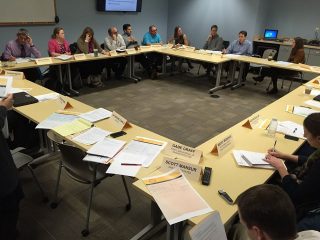The Vision Zero Network, a national non-profit on a campaign to help communities eliminate traffic fatalities and injuries, has just launched their “Focus Cities” program and Portland has been chosen as one of the ten cities to take part. The other cities are Austin, Boston, Chicago, Ft. Lauderdale, Los Angeles, New York City, San Francisco, Seattle, and Washington D.C..
Vision Zero Network Director Leah Shahum said in a statement that, “These cities are the pioneers who will save lives by modernizing our approach to traffic safety.” “For too long, communities have accepted traffic fatalities and injuries as normal. The Vision Zero Focus Cities are standing up to challenge ‘business as usual’ and to show cities around the world that these tragedies are unacceptable and preventable.”
Shahum said the ten cities were selected based on their commitment to Vision Zero. Portland has indeed taken the ambitious concept seriously by unanimously adopting it at City Council and launching a task force to tackle the long-range and multi-jurisdictional effort it will take to achieve it.
Advertisement
Two weeks ago an elderly woman was hit and killed while trying to cross SE 156th and Division, the third person to die at that intersection since 2012. Three days later the Portland Bureau of Transportation was out on the scene to begin installation of a flashing beacon (the work continues today). That response, the bureau said, came because “We believe the death or serious injury of even one person on Portland roadways is one too many.”
In addition to a Task Force made up of advocates and other interested parties, PBOT’s Vision Zero effort includes a Technical Advisory Committee that has been meeting monthly. This group is made up primarily of transportation agency staff and aims to provide expertise around policy language, community outreach, engineering, maintenance, enforcement, education, and data collection. At their meeting on January 14th they reviewed 40 draft action items that included, “instituting a multi-agency fatal crash rapid response team, tackling DUIIs at the source through strategic partnerships with bars and lowering and better enforcing posted speed limits on High Crash Corridors.” PBOT’s effort also includes some of their most detailed work ever in terms of learning more about where crashes happen. They’re going beyond Oregon Department of Transportation data (which tends to vastly underreport biking and walking crashes) to learn more about where vulnerable roadway users are most often being hurt and killed.
“We’re hopeful this will lead to specific tools to fix specific probelms,” PBOT Program Manager Gabriel Graff shared in a recent interview.
As a Focus City, Portland will join a collaborative network of representatives from other cities that will share data, best practices, and have regular communications with each other — all of which will be facilitated by the Vision Zero Network.
Think of it like the Green Lane Project, but for safety.
— Jonathan Maus, (503) 706-8804 – jonathan@bikeportland.org
BikePortland can’t survive without paid subscribers. Please sign up today.


